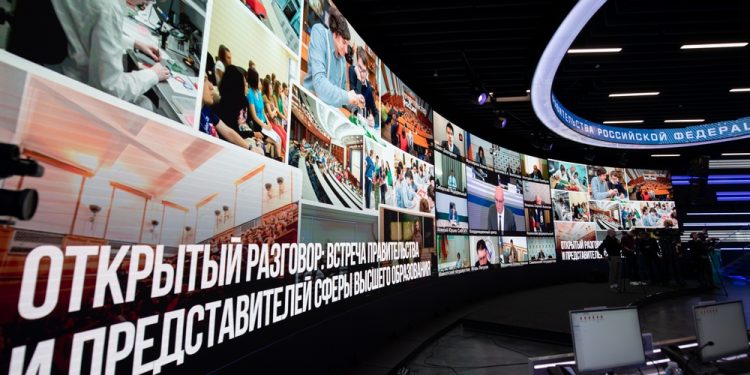The past months have shown that Russia is successfully resisting the sanctions. Not a single program for the development of higher education has been stopped, the construction of world-class campuses continues, and the Priority 2030 program is being successfully implemented. Measures to support the industry in the face of new challenges were discussed at an open conversation between the Government and representatives of higher education.
As Deputy Prime Minister of the Russian Federation Dmitry Chernyshenko noted, the main task facing Russian universities today is to maintain the pace of training highly qualified personnel for all sectors of the economy.
The Vice Prime Minister focused on the fact that the higher education sector, as an integral part of the country, faced a number of challenges, and solutions were quickly found for each of them. As an example, he cited measures taken in response to discrimination and expulsion of Russian students who studied abroad.
“The government reacted promptly, and an act was adopted that allowed Russian students expelled from foreign universities to enter Russian universities,” Dmitry Chernyshenko said.
According to the head of the Russian Ministry of Education and Science Valery Falkov, at the moment the ministry has received 1,213 applications for transfer to Russian universities from students studying in foreign universities, and 416 children have already begun their studies.
The minister noted that the department regularly holds meetings with the heads of universities, where the difficulties that the scientific and educational industry had to face are revealed. One of the most significant measures to support universities was the introduction of a moratorium on scheduled and unscheduled inspections of universities – this year they will not be carried out.
Another measure will be the easing of requirements for grants for innovative projects.
“We are talking about providing an opportunity to reduce obligations to attract extrabudgetary funding, reduce mandatory reporting on the use of grant funds, and make changes to previously approved plans for the implementation of innovative projects,” Valery Falkov explained.
In order to reduce the administrative burden on universities, orders to establish the scientific categories of universities will be cancelled. Since 2019, all universities have been divided into three categories to evaluate and monitor performance. Currently, research support for universities is being implemented as part of the Priority 2030 program. Such categorization will remain only for scientific organizations.
At a meeting of representatives of higher education with the Government, Valery Falkov called on the heads of universities to concentrate resources on research topics that provide solutions to critical scientific and technological problems.
“We have groundwork, and we need to devote all resources to ensure that we give a decent result in the shortest possible time. To this end, together with the Russian Academy of Sciences, we have identified the priority results of scientific research. We suggest that you, together with the business community, adjust government assignments in terms of scientific research aimed at obtaining concrete results with a perspective of implementation,” the Minister added.
Not a single industry development program, the head of the Ministry of Education and Science assured, will be stopped this year. We are talking about such programs as Priority 2030, the construction of youth laboratories, and the provision of housing certificates to young scientists. Valery Falkov clarified that a part of this program has already been implemented, and a part will be implemented before autumn.
“It is important for universities here that not only employees of scientific organizations, but also university professors have the right to participate in this program,” the head of the Russian Ministry of Education and Science specified.
It should be noted that the total volume of enrollment for state-funded places in universities continues to grow. In 2022, 11,546 more people will be accepted than last year. Universities provide more than 588 thousand state-funded places, most of them allocated to medical, pedagogical and engineering specialties.
Thus, in recent years, a record level of accessibility of higher education has been achieved: approximately 64% of secondary school graduates today are provided with the opportunity to enroll in state-funded places.
As for the employment of university graduates, according to Dmitry Chernyshenko, it is necessary to take a comprehensive approach to planning and creating jobs for young professionals.
“The departure of foreign companies may lead to an increase in unemployment, including among university graduates. To prevent this, the Ministry of Labor, together with the Ministry of Education and Science, is now implementing a program for the employment of graduates, ”said the Deputy Prime Minister.
At the end of the meeting, Dmitry Chernyshenko instructed the Russian Ministry of Education and Science to determine the needs of universities for equipment and software by May 15, as well as update the list of the most demanded professions and areas of training in order to quickly adjust admission numbers.








